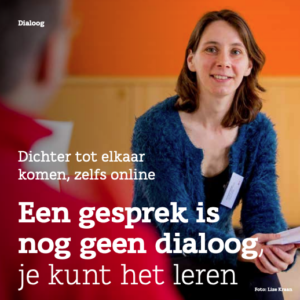In the neighborhood approach Belonging we visualize the impact of dialogues on the feeling of belonging. We explore sustainable change on a personal level, in communities and in collaboration between residents and professionals. Below is a small selection of what we discovered in 2020. Are you missing something or do you have something to add? We would like to hear it!
Participants on the effect of dialogues
The impact of dialogues extends beyond the conversation at the table, it has a long lasting effect, even to the surroundings.
– Jolanda, who has been participating in dialogues in Leidsche Rijn for some time:
“The dialogues have made me much more open and I now dare to speak to people more easily in the neighborhood. I always say” good morning “or” good afternoon “when I meet someone and that often leads to a chat.”
– Read here what Maria, who interned during her master’s study at Utrecht in Dialoog, has to say about
the power of dialogue.
“Dialogue can help stop polarisation and increase social inclusion.”
– Read hee what Srikar says about achieving more understanding through dialogues.
“The value of a dialogue is speaking face-to-face with people you would normally not meet, and having real human interaction. Nowadays a lot happens on social media, where many things are anonymous and dehumanised, and everyone is trying to prove their point. Dialogue brings the physical space back, and makes you consider your own worldview as you are confronted with other insights and experiences. I feel it makes you more empathetic, and reminds you that other people come from very different backgrounds to your own.”
Dialogues for community building
– Read the summary, conclusions and recommendations of Jedidjah Artentsen, Lisa Mulder and Josephine Timmers who carried out Community Based Research during the corona lock down spring 2020 into how dialogue contributes to everyone being able to belong through different elements of inclusivity.
- Participants appreciate the dialogues and experience Utrecht in Dialoog as a safe and open place where a sense of belonging can arise that is important for the formation of a community.
- Dialogues also give participants a greater sense of belonging or empathy towards other people. In this sense, Utrecht in Dialogue contributes to an imagined community in the city.
- Dialogues also contribute to initiatives that are undertaken to strengthen the community outside Utrecht in Dialogue. And neighborhood initiatives to strengthen the community within the neighborhood.
- The philosophy behind the appreciative dialogue ties in very well with intercultural competences. Just as empathy, openness, respect and curiosity play a major role in intercultural competences, this is also very important in appreciative dialogue. Equality is an important starting point in the appreciative dialogue.
- Participants found zoom a pleasant way to conduct dialogues and liked the fact that everyone literally took up the same amount of space.
- Dialogue counselors have many intercultural behavioral skills. They listen carefully to the experiences of the participants, let participants finish their conversation and participants feel heard and motivated to share their own stories.
- Online works better because you literally have everyone in the picture, you see what is happening with everyone, all take up the same amount of space on that screen and it is clearer who is speaking.
- By “eating together” during an online dinner dialogue, the conversation feels “looser”. An advantage of the online dinner dialogue compared to a dinner in real life was also that at the “real” meals, participants sometimes found it difficult to make themselves understood. Additionally, at an online dinner you can talk to more people at once.
More on the Community Based Research >>>
– Watch the video in which actively involved people tell from home what (online) dialogues bring them in corona time.
Form a learning community in dialogues
In the Wijkdialoog Workshop and Wijkdialoog Course Wijkdialoog, residents from different neighborhoods learn with each other.
“Good for brainstorming together about options and approach.”
“Knowledge exchange and cross-fertilization are very effective.”
“You can connect and strengthen with neighborhood dialogue.”
“I feel the energy of dialogue again”
“The three case studies that we have developed also turn out to be my theme.”
“This evening gives me a soulmate feeling. We have to do it and learn from each other. ”
“By doing a case it becomes tangible”
“Reflecting well on what you aim for and the approach”
Dialogues in consultation between residents and professionals
– Watch the video in which those involved explain what the series of ‘Healthy conversations’ with residents, professionals and entrepreneurs brings.
Dialogues in education
-Read Maria’s story and research report: “The impressions of Dialogues and their educational use”. In her master Youth, Education and Society at Utrecht University, Maria Chatzidionysiou has visualized the power of dialogues in education by means of interviews with stakeholders. She investigated how dialogues can be used in education and what influence dialogues can have in reducing polarization and maximizing social inclusion. The results show that not all participants share the same views when it comes to the “Dialogue” and that they are therefore divided about its employability in the educational sector. The results of this research were presented, discussed and in-depth with stakeholders in the workshop on impact of dialogue in June 2020.
“When have you come to peace with another who is very different from you? And what was needed for that? ” This question is asked by Wilma de Buck, from Utrecht in Dialoog. Together with four others, we had an (online) dialogue in the dialogue training on the theme of the Peace Week. It is a penetrating question that makes me think about connecting differences and how I have experienced this myself in my life. It is special to share these experiences with others and then to think about the concrete steps you can take yourself to promote more connections between people.”



